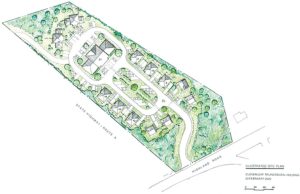Cloverleaf Won’t Help Seasonal Workers
To the editor:
Re last week’s two op-ed columns [July 23, page A3]:
Sen. Julian Cyr, perhaps the best elected official in the state, beats the drum for the Cloverleaf project by citing the lack of affordable housing in Truro and the need of all those folks of color who come here to serve others with money.
Though surely it’s a commendable sentiment to want decent housing for those who serve the luxury living of others, the fact is that most of those serving the seasonal class are here only a short time and need short-term living space, and those same service folks could not afford even the “affordable” rent required for units at the Cloverleaf. So, though the Cloverleaf may provide nice housing for some who cannot afford market-rate housing in town, it ain’t gonna be for the people of color Cyr mentions.
Veterinarian Sadie Hutchings, in her op-ed, has finally called attention to the know-nothings who lump all short, shiny-coated, “blocky-headed” dogs in one category of innately vicious canines. In delineating some of reasons a dog, any dog, may bite, however, the doctor forgets to mention that none of the breeds lumped together as “pit bulls” is any more likely to bite than is a dog from any other breed. It’s just that, often, cruel owners of such dogs train them to be “vicious.” No dog, not even a wolf or coyote, is innately vicious.
Dan Katz
Truro
Cloverleaf: An Important Step
To the editor:
Kudos and thanks to state Sen. Julian Cyr for penning the definitive analysis of what’s going on with the Truro Cloverleaf project.
We have a chance to make a concrete difference in the lives of our friends and neighbors — let’s not be distracted. Instead, let’s move ahead, confident that our town is making an important step in the right direction.
Edouard Fontenot
Truro
More on the Task Force
To the editor:
Your article last week on the planning for Wellfleet’s annual town meeting [July 23, page A9] left out the names of some key members of the task force. The online version of the story has been updated to include their names, but your print readers should know that Fire Capt. Joe Cappello, Police Lt. Kevin LaRocco, Assistant DPW Director Jay Norton, and Assistant Town Administrator Mike Trovato have each been an integral part of the planning and they deserve recognition for their contributions.
Dan Silverman
Town Moderator
Wellfleet

 One of the callers, Regan McCarthy, former president of the Truro Part-Time Resident Taxpayers Association, said people are too intimidated to speak out.
One of the callers, Regan McCarthy, former president of the Truro Part-Time Resident Taxpayers Association, said people are too intimidated to speak out.


